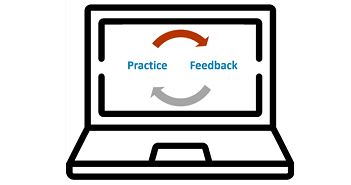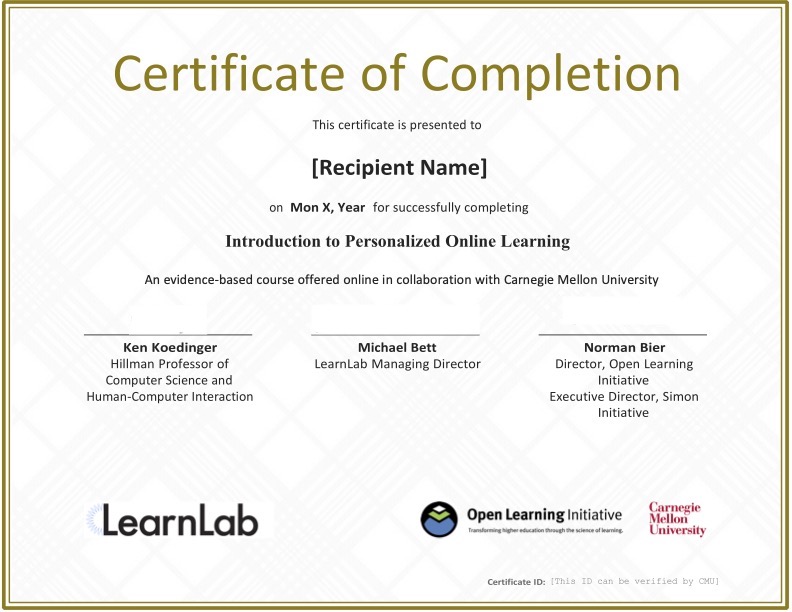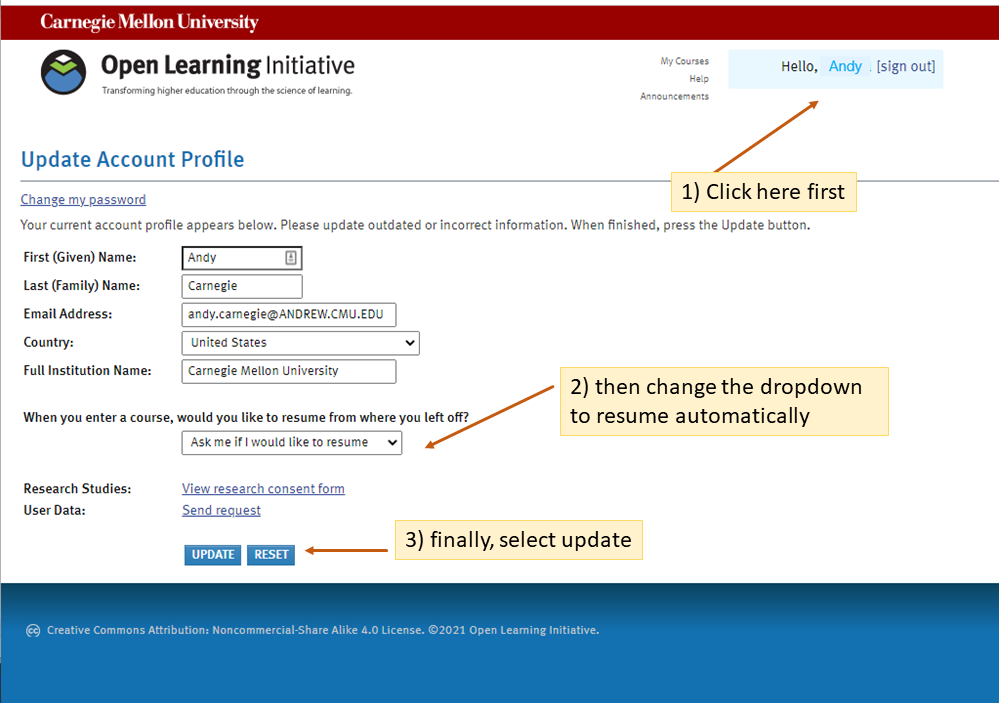Designing Effective Online Tools


Start Any Time
Work on your pace and you will have instructors available to help you answer any questions.

Duration
Approximately 3 weeks, 6-8 hours/week

Fee
$1500 - Professional Rate
$500 - Full-time Student Rate*
*Proof of full time student enrollment required. Acceptable forms of id include a letter from your university’s registrar office or an unofficial transcript. Email your documents to learnlab-help@lists.andrew.cmu.edu
Certificate Course Description:
This course will cover three principles often used when designing, improving and evaluating tools for online learning.
- The first is the fundamental human activity of feedback. You will be thinking about and learning practical ways to provide information to students about their performance on tasks. We will look at what makes for good feedback, how it helps students learn, and when feedback may be harmful for learning.
- Second, we will discuss guided discovery. More generally, this is a view of learning as a constructive activity that differs from more traditional views of learning as transmission of knowledge from teacher to student. We will examine how to scaffold this process and focus on activities that ask students to think of solutions themselves before they know the correct solution.
- Finally, we will look at practical applications of deliberate practice and what it means to incorporate deliberate practice into the tools you build. We hope this course will help you develop the foundations for building almost any tool for learning and provide a deep understanding of why some tools help people learn and others do not.
Our team hosts office hours for all courses over Zoom on the 2nd and 4th Wednesday of each month, 10:00 AM – 11:00 AM EDT/EST (4:00 PM – 5:00 PM CAT). On 2nd Wednesdays, Dr. Ken Koedinger, who is the Director of the Masters of Educational Technology and Applied Learning Sciences (METALS) program, will be available. On 4th Wednesdays, you will have the opportunity to speak with our learning engineers.
Module 1:Feedback Characteristics and Attention
- Identify defining characteristics of task feedback
- Classify feedback cues based on how they impact attention
- Predict the effects of task feedback on performance
- Recognize effective feedback tips and articulate their theoretical underpinnings
Module 2: Guided Discovery
- Distinguish guided discovery techniques from tell and practice
- Articulate the benefits of guided discovery
- Recognize appropriate applications of guided discovery techniques
Module 3: Deliberate Practice
- Define deliberate practice and how to achieve it
- Articulate the effects of deliberate practice and why it works
- Decide when to apply deliberate practice
Module 4: Course Project
At the end of the course, you’ll have an opportunity to do a project where you will design and create a simple prototype of a learning tool to demonstrate interactions that apply principles you’ve learned in the course. This will provide you with an experience applying the fundamentals you will learn in the modules to a larger, more authentic, context. It will be graded and you will receive personalized feedback.
Foundations for Online Tool Design
The course project allows some opportunity for advanced technical prototyping skills, but this course will allow for less technical prototypes.
Researchers, product/UX designers, instructional designers, or anyone interested in educational technology wanting to learn about, design, and create tools for effective instruction.
What you'll learn
This course will help you:
- Learn practical skills with core principles for designing, improving, and evaluating tools for online learning
- Appropriately use feedback in online tools to improve student learning
- Apply guided discovery techniques that promote active learning
- Design deliberate practice into tools to improve student performance
Course Instructors

Dr. Chinmay Kulkarni
Dr. Chinmay Kulkarni is an associate professor of Human-Computer Interaction at Carnegie Mellon University. His research focuses on building technology that uses the networked properties of online communities to improve how people live and learn. His work combines design techniques, AI models, and research on learning to create learning systems that work at scale. This research has already helped 100,000+ students from 130+ countries learn more effectively in MOOCs, and has advanced the science of learning.
Certificate
Upon successful completion of the program, participants will receive a verified digital certificate of completion from Carnegie Mellon University’s Open Learning Initiative.

In addition to the knowledge and immediately applicable frameworks you will gain by attending your selected courses, you will benefit from:
- A digital, verified version of your Executive Certificate (Smart Certificate) you can add to your resume and LinkedIn
- Networking with a global group of your peers and instructors for advancing your career
Register Now
Register and start taking the course in four steps:
1. Enter your email address
[ninja_form id=28]
2. Watch this short video for instructions on how to register in OLI.
3. For this course, copy the course key: TFOL2-001
4. Click on this link to Carnegie Mellon University’s Open Initiative to register and try out the course for 48 hours before payment is due.
5. (Optional but highly recommended) Set OLI to automatically resume from where you left off in the course.
1) Click on your name in the upper right corner to bring up your OLI profile settings.
2) Change the option on the dropdown to resume automatically.
3) Lastly, select UPDATE.
You are all set!
